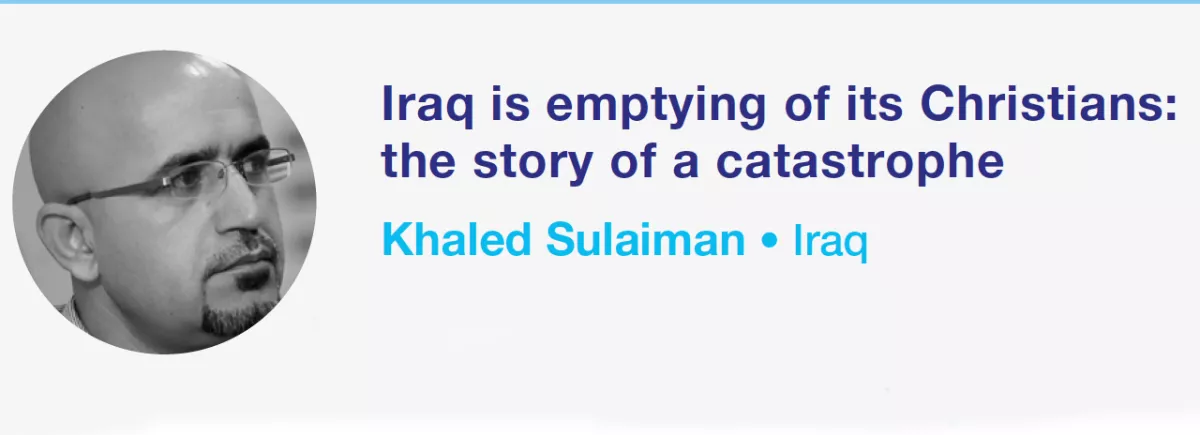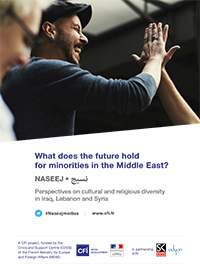
Iraq is emptying of its Christians: the story of a catastrophe
Related project
NaseejDiscover a selection of the best articles dealing with cultural and religious diversity in the Middle East, entered in the Naseej competition launched by CFI and SKeyes in October 2017.
This week, Iraqi journalist Khaled Sulaiman wonders about the fate of Christians in Iraq, who fled the country to escape terrorism.
Published in Al Mada on 26 August, 2017
Mosul, Summer, 2014. A Christian activist said the following to me, before Islamic State invaded the city: "We're afraid our ancient churches and monasteries will be turned into museums, buildings and stately mansions serving as a memorial, that tourists come to visit." The person I was speaking to thus expressed a fear that the media only raised after 2003. The fear of seeing Iraq being emptied of its Christians, because of unprecedented terrorism that is threatening their existence in the country.
The Mosul activist's fears about the future of their community and their country, which is virtually stripped of its Christians, were embodied in a photo that appeared in the press, showing the last Christian living in Khanaqin, 160 km south-east of Baghdad. This man is the last of his religion to live in the city, along with his family, and to practise his faith within the walls of his home. Sami Ebbou lives near an abandoned church in the city of Khanaqin, a church whose cross still towers over the surrounding ancient buildings. He says: "This is no longer our church. It's turned into an abandoned building and Christians can no longer practise their religious rites there." He expressed himself in
the plural form, forgetting that he is the last of the city's Christians.
To the south, more specifically in the city of Basra, Iraq's third largest city inhabited by Christians, the number of Christian communities (Chaldean, Syriac and Armenian) fell between 2003 and 2014 from 1,500 families to 337, according to the patriarchal representative for the cities of Basra and Amara and the Arabian Gulf (Bishop P. Imad Yalda). A Christian cleric from southern Iraq cites numerous reasons encouraging emigration.
Unprecedented acts of violence
The Christians of Iraq had not experienced, within their modern history, violence such as that directed at them after 2003, which led to a major demographic change within their community, in favour of the Muslim majority. On 14 February 1963, during the Ba'athists' coup d'état against the government of Abdul Karim Qasim, the French newspaper, Le Monde, talked of acts of violence against the Christian minority in Iraq. However, these campaigns had not caused any drastic demographic or religious changes within Iraqi society. Le Monde also published, around the same time, a report saying: "Within the new government's official circles, there is talk that we have lists of the names of all the Communists and we will not allow any of them to escape us. Such is the fear among Chaldean
Christians who have, it is said, joined the Communist ranks."
It was in this context that the proclamation of the Republic of Iraq in 1958 became a major landmark in Iraqi political and cultural circles. According to them, this proclamation changed the position of the country's minorities. Promulgation of law number 188 of the Personal Status Code in 1959 was a significant gain for minorities, according to specialists on Iraq and the region. But the respite was of short duration as Iraq was plunged into violence and coups d'état once more, as of 8th February 1963. The terror of the purges carried out by the Ba'athists targeted the Chaldean Christian minorities first of all, before targeting other Iraqi categories, due to their alignment with the Communists. The first Iraqi constitution of 1925 makes no mention of any religious or ethnic minority in the country.

According to the census of 1987, Iraq's Christian population was one million, four hundred thousand people. This number increased to one and a half million people in 2003, before falling to less than 300,000 people in 2016. This is due to unprecedented acts of violence committed after 2003 by radical Islamist groups against churches and places of worship, as well as their business premises and cultural centres.
Al-Qaida, and Daesh, which emerged from it were even more hostile towards religious minorities in Iraq. The Arabic symbol " ن" (letter "N") that Daesh wrote on the houses and properties of Christians in Mosul after 10th June 2014, marked the start of the most violent episode in a series of cruel acts committed against Christians, in the aim of forcing them to leave the country or live with the sword of Damocles hanging over their heads.
Besides the acts of violence and terrorism targeted at Christian minorities, other inequalities also exist with regard to Christians and other minorities, in Islamic legislation concerning inheritance, marriage, divorce, pensions and other legal proceedings within the courts' remit. In short, the current laws are unfair towards minorities, who suffer the repercussions on their lives, traditions and cultures.
Besides the problems of terrorism and religious radicalism, there are five main challenges for Christians:
1- The problems of education and access for children from Christian and minority communities to an educational system that takes no account of their specific religious and cultural needs.
2- The freedom to renovate places of worship or to establish new ones.
3- The problems of working in an environment dominated by veiled social and religious discrimination.
4- Justice in the courts and, of course, before the law.
5- The right of assembly and to form associations.
In addition, the Christians and Iraq's other religious, ethnic and cultural minorities need a civil law to protect them from organised discrimination and violence. Peaceful coexistence, without any governing, protective law, and of course, rights and duties, remains a utopian dream. Laxness in protecting indigenous people in their religions, cultures and traditions is synonymous with an Iraq stripped of its history and its multiple cultures.
A catastrophe that will affect the country, whose surviving churches would be nothing more than abandoned places.
Find the ten finalists of the
Naseej competition in the What does the future hold for minorities in the Middle East?



